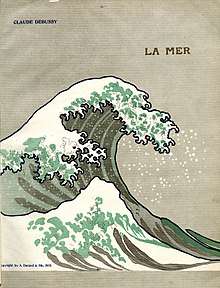Jeux d'eau (Ravel)
Jeux d’eau (pronounced [ʒø do]) is a piece for solo piano by Maurice Ravel. The title is often translated as "Fountains", "Playing Water" or literally "Water Games" (see Jeux d'eau, water features in gardens). At the time of writing Jeux d'eau, Ravel was a student of Gabriel Fauré, to whom the piece is dedicated. Pianist Ricardo Viñes was the first to publicly perform the work in 1902, although it had been privately performed for Les Apaches previously.
The piece was inspired by Franz Liszt's piece Les jeux d'eau à la Villa d'Este (from the 3ème année of his Années de pèlerinage),[1] and Ravel explained its origins in this way:
Jeux d'eau, appearing in 1901, is at the origin of the pianistic novelties which one would notice in my work. This piece, inspired by the noise of water and by the musical sounds which make one hear the sprays of water, the cascades, and the brooks, is based on two motives in the manner of the movement of a sonata—without, however, subjecting itself to the classical tonal plan.
Written on the manuscript by Ravel, and often included on published editions, is the text "Dieu fluvial riant de l'eau qui le chatouille..." a quote from Henri de Régnier's Cité des eaux,[2] which in English editions is sometimes translated to "River god laughing as the water tickles him ...". The tonality of the piece is E major.
The piece uses non-standard keys included on larger Bösendorfer models, often written into scores using a substituted low A (the lowest key on the standard keyboard) near measure 57, which should be a half-step lower at G♯.[3]
The work was first published by Eugène Demets.
Notes and references
- Arbie Orenstein: Ravel. Man and Musician (New York and London: Columbia University Press, 1975), ISBN 0-231-03902-6, p. 154.
- Gerald Larner: Maurice Ravel (London: Phaidon, 1996), p. 68, ISBN 0-7148-3270-7.
- https://www.pianoexperts.com/wp-content/uploads/2015/11/What-makes-a-Bosendorfer-a-Bosendorfer.pdf
External links
- Jeux d'eau: Scores at the International Music Score Library Project (IMSLP)
- Jeux d'eau performed by Beau Pluto
